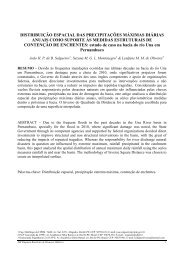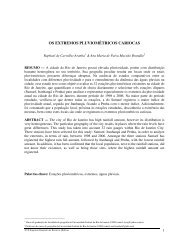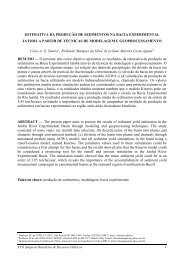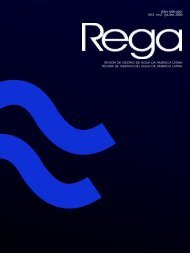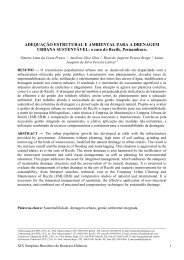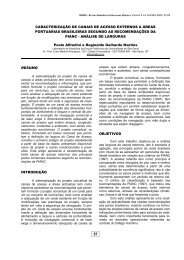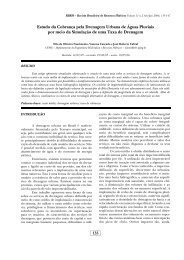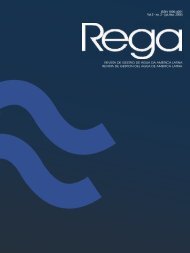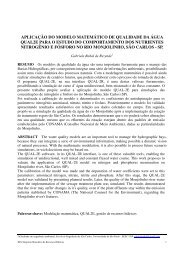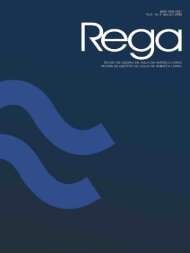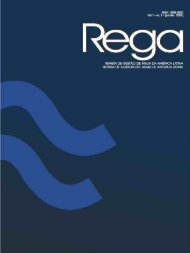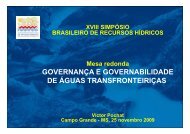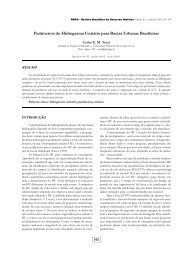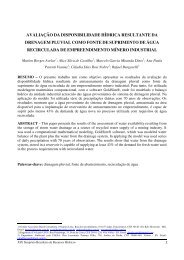Rega-17 (sem issn) - Cepal
Rega-17 (sem issn) - Cepal
Rega-17 (sem issn) - Cepal
- No tags were found...
Create successful ePaper yourself
Turn your PDF publications into a flip-book with our unique Google optimized e-Paper software.
20 años del Códigode Aguas de ChileHumberto Peña TorrealbaRESUMEN: El código de aguas de Chile de1981, ha sido motivo de permanente interés yanálisis tanto dentro de Chile como en el exterior,por su orientación marcadamente neoliberaly la incorporación, por primera vez en Latinoamérica,de mecanismos de mercado en laasignación de los recursos hídricos.En el trabajo, se evalúan los resultados de laaplicación práctica de dicha legislación por másde 20 años, a partir de la experiencia directa de laAdministración. En este sentido, muchos análisistienen un carácter descriptivo y no pretenden “demostrar”lo que es el resultado de la casuística adquiridaen el trabajo cuotidiano. Por lo mismo, eneste caso la validez del mensaje y su interés, si lotiene, es inseparable de quién lo emite.El desarrollo del documento se hace desde laperspectiva de los objetivos que tuvieron presentelos creadores de la legislación, los cuales se puedensintetizar en : la generación de derechos deaprovechamiento “sólidos”, la creación de mercados,y la reducción del rol del Estado (“estatismo”).A este respecto se concluye que la existenciade derechos de aprovechamiento con una alta seguridadjurídica ha tenido una positiva influenciaen el mejoramiento de la eficiencia de aprovechamiento.Por su parte la idea de incorporarmecanismos de mercado en la asignación de derechosoriginales a nuevos interesados, prácticamenteno ha operado, generando un proceso decarácter especulativo que actualmente se trata decorregir con una reforma legal. Por el contrario,el uso del mercado como mecanismo de reasignaciónde los derechos existentes, en general seconsidera exitoso y ha permitido la transferenciade derechos a las nuevas demandas en un marcode acuerdo social y eficiencia económica.En relación con la reducción del papel de laAdministración, se estima que ello ha sido, engeneral, negativo, en especial en lo referente a laregulación del funcionamiento de las organizacionesde usuarios, al control de la entrega de de-ABSTRACT: The Chile Water Code, datingfrom 1981, has been a subject of permanentinterest and analysis, both in Chile and abroad,because of its markedly neoliberal orientationand the inclusion, for the first time in LatinAmerica, of market mechanisms in assigningwater resources.In this study, the results of the practical applicationof this law for over 20 years are evaluated,based on the direct experience of the Administration.Many of the analyses for this purposehave a descriptive character, and are notintended to “demonstrate” what are the resultsof the collection of cases acquired in daily work.Equally, in this case the validity of the messageand its usefulness, if any, cannot be distinguishedfrom the one who issues it.The paper is developed from the perspectiveof the objectives that those who created thelaw had in mind, and can be summarized as:generating “solid” development rights, creatingmarkets and reducing the role of the State (“statism”).In this regard it is concluded that the existenceof legally very secure development rightshas had a positive influence on improving theefficiency of development. On the one hand, theidea of incorporating market mechanisms to assignoriginal rights to new interested parties practicallydid not operate, generating a speculativeprocess which one is now trying to correct bylegal reform. On the other, the use of the marketas a mechanism to reassign the existing rightsis generally considered successful, and hasallowed transferring rights to the new demandswithin the framework of a social agreement andeconomic efficiency.As to the reducing the role of the Administration,it is estimated that this has generallybeen negative, especially as regards the regulationof functioning of user organizations, controlof granting development rights to private



